JingYan NEWS
Hoping for a Day When No Child Suffers from Thalassemia
Release time:
Feb 01,2024
Hoping for a Day When No Child Suffers from Thalassemia
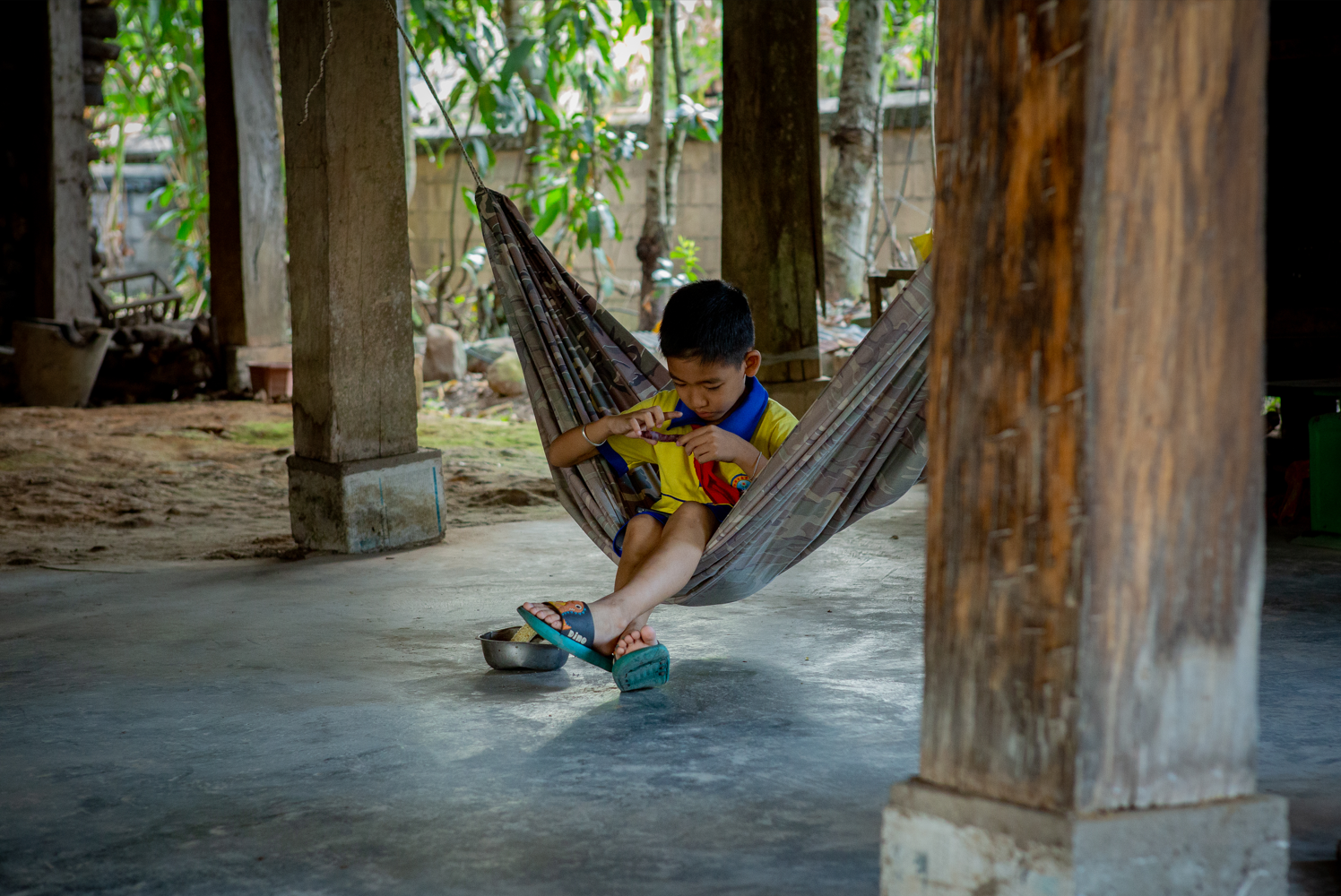
The courtyard was bustling with guests. Xiaoyan swiftly descended from the Dai bamboo house, effortlessly engaging in conversation with the visitors one moment, and then happily tinkering with a toy moon rover they had brought as a gift the next, fully immersed in the enjoyment.
The courtyard was filled with laughter as the lively 8-year-old Xiao Yan charmed the guests. “You’d never guess he was once a severe thalassemia patient,” someone remarked, while others praised his mother, YI Xiangyue, saying, “What an incredible mom!” With heartfelt emotion, YI Xiangyue shared the struggles she and Xiaoyan had faced in their fight against thalassemia, expressing deep gratitude to the visitors for their invaluable support and assistance.
Among the guests were representatives from the hospital that performed Xiaoyan’s bone marrow transplant, members of the charity organization that funded the surgery, and the CEO of the genetics company that provided free marrow matching services. This heartwarming gathering was part of a follow-up visit organized by the Beijing Jingyan Foundation, one of China’s pioneering charities dedicated to aiding children with thalassemia. Xiaoyan’s journey is a powerful example of the over 800 children whose lives have been transformed through the Foundation’s unwavering efforts.
The Child Who's Always at the Hospital
Before the age of seven, Xiaoyan’s life revolved around hospitals, spending more than half the year shuttling between home and medical appointments. At just four days old, he was placed in an incubator at Mengla County Hospital for jaundice. By 40 days, a swollen stomach resulted in a diagnosis of intestinal obstruction, and doctors advised immediate surgery. Concerned by his worsening condition—he hadn’t been able to drink milk for days—Xiaoyan’s mother, Yi Xiangyue, and her husband took him to the Xishuangbanna Prefecture Hospital for a second opinion. There, doctors determined he wasn’t suffering from an intestinal obstruction but rather congenital megacolon, with a necrotic section of his intestine. They advised the family to seek better-equipped facilities in Kunming for surgery. Following the recommendation, the family traveled to Kunming, where their three-month-old son underwent a series of procedures, including bowel irrigation, intestinal resection, and anal dilation. "For one to three months after the surgery, we had to dilate his anus daily for 20 minutes. Each time, he cried so hard his legs trembled," Yi Xiangyue recalled.
A month later, during a follow-up visit, doctors found Xiaoyan’s hemoglobin level alarmingly low at 98g/L (normal range: 110–160g/L), attributing it to poor nutrient absorption. At just four months old, Xiaoyan suffered from chronic diarrhea, relied on diapers around the clock, and ate very little. Sometimes, while nursing, green stools leak out. He struggled with feeding altogether—rejecting breast milk, refusing a bottle, and spitting out spoon-fed food. “We never knew how much he actually ate each day,” Yi Xiangyue recalled.
Once again, the family returned to the Xishuangbanna Prefecture Hospital, where blood tests revealed his condition required a transfusion. Initially hesitant, fearing Xiaoyan was too young, the couple eventually relented after being told a lack of transfusions could severely affect his growth. Born at 3.4 kilograms, Xiaoyan had only reached 4 kilograms by four months.
After his first transfusion, Xiaoyan experienced about two weeks of normal growth before relapsing into diarrhea. During another visit to Mengla County Hospital, the family coincidentally encountered a team of visiting experts from Shanghai. These specialists found his hemoglobin had plummeted to 50g/L and urgently recommended thalassemia screening for the whole family.
At the time, the screening cost 480 yuan per person. Struggling financially, the couple decided to have only Xiaoyan tested, opting not to screen his grandmother or older sister. Over a month later, their worst fears were confirmed: Xiaoyan was diagnosed with severe thalassemia. Doctors explained that this congenital blood disorder would require lifelong blood transfusions and iron chelation therapy, with bone marrow transplantation as the only potential cure—a procedure costing hundreds of thousands of yuan. It was the first time Yi Xiangyue and her husband had ever heard of the disease. The news was devastating, leaving them feeling as if "the sky had collapsed."
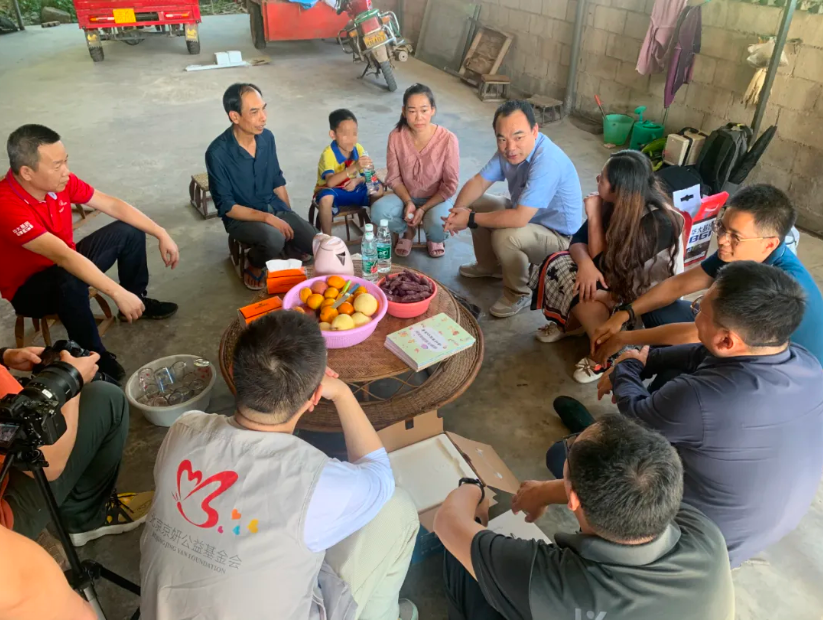
Yi Xiangyue refused to accept the diagnosis. She believed her son’s health issues stemmed from his intestinal problems and that, once his digestion and nutrient absorption improved, his condition would stabilize. Without clear instructions from doctors to schedule regular blood tests or transfusions, the family didn’t commit to routine care.
However, Xiaoyan’s health continued to deteriorate. He frequently fell ill with colds, coughs, and diarrhea, his complexion pale and lips devoid of color. Each hospital visit revealed dangerously low hemoglobin levels, often in the 60s or 70s, necessitating lengthy hospital stays and transfusions. This cycle of illness, hospitalization, and transfusion repeated itself until Xiaoyan was over two years old.
Around this time, another parent introduced Yi Xiangyue to a WeChat group with hundreds of families across Yunnan, all navigating life with children affected by thalassemia. The group’s daily conversations centered on blood transfusions, iron chelation therapy, and bone marrow transplants. It was in this community that Yi Xiangyue finally came to terms with the reality of her son’s condition: Xiaoyan was one of many children living with severe thalassemia.
50,000 yuan, A Timely Helping Hand
After joining the group, Yi Xiangyue heard from other parents of thalassemia children that two children from Yunnan had undergone successful bone marrow transplants at Shenzhen Children’s Hospital and returned home in recovery. This was a huge ray of hope for Yi Xiangyue. She thought to herself, “Don’t give up. Think of a way. If the transplant is possible, I will take my son for the procedure. No matter what, I will make sure he gets better.” With newfound hope, the next major hurdle was finding the money.
The year before Xiaoyan was born, his grandfather passed away from rectal cancer. By the time Xiaoyan was born in September 2015, the family was still struggling to repay the medical debts from his grandfather’s illness. At the same time, they had to rush Xiaoyan to the hospital for treatment. Before Xiaoyan's grandfather was diagnosed with cancer, Xiaoyan’s father had purchased a truck to make a living by transporting goods. However, when the family had to care for the elderly man, Xiaoyan’s father stopped his hauling business. Later, when Xiaoyan was born and needed constant blood transfusions and treatment, he could no longer continue the work and sold the truck for a mere 8,000 yuan. Eventually, even the family’s tractor was sold to cover medical expenses. By then, Xiaoyan’s family had not yet applied for social assistance.
To cover the costs of blood transfusions and the daily expenses of their five-member family, the couple relied on tapping rubber trees and borrowing from relatives and friends. YI Xiangyue would borrow from her mother whenever she could. If her mother didn’t have enough, Yi Xiangyue turned to her grandmother, who, despite being over 80 years old and only receiving 500-600 yuan in pension every month, lent Yi Xiangyue the money to help cover XiaoYan’s treatment costs.
Initially, the couple went together to the hospital with Xiaoyan. However, when Xiaoyan was over a year old and could walk, Yi Xiangyue started taking him to the hospital alone while her husband continued to work in the rubber plantations to support the family. The rubber tapping season in Xishuangbanna runs from April to November. “On a good day, you might earn 100 to 200 yuan, but there are days when it rains, and we can’t work. Sometimes it rains for a whole week, and there’s nothing to do,” Yi Xiangyue said.
In 2018, things became even more difficult for the family. Yi Xiangyue was diagnosed with tuberculosis, and not long after, Xiaoyan’s father fell from a building and injured his left eye. Yi Xiangyue’s mother not only covered all the medical costs for her son-in-law’s treatment in Kunming, but she also took care of Xiaoyan for 23 days while Yi Xiangyue went to the hospital and made sure to take Xiaoyan for his blood transfusions.
While Yi Xiangyue’s husband was at home recovering and unable to work, she sold vegetables at a market, earning about 1,000 yuan a month, which was barely enough to cover Xiaoyan’s blood transfusions. Every morning at 2 a.m., she would go to the wholesale market for vegetables. Over time, she became exhausted.
In 2019, Yi Xiangyue went to Shenzhen Children's Hospital with another thalassemia parent from Yunnan to start the paperwork for Xiaoyan’s bone marrow transplant. BGI Group provided free compatibility testing, but no match was found with Xiaoyan’s parents or sister. However, Xiaoyan was lucky enough to find a compatible donor from the Chinese Bone Marrow Donor Program. The fundraising effort became urgent. The hospital estimated that they would need at least 400,000 yuan. The income from Yi Xiangyue’s husband working on the rubber plantation and her vegetable sales could only cover daily living expenses. Yi Xiangyue applied for assistance from the government. Upon learning that Yi Xiangyue could sew traditional Dai clothing, the government suggested she apply for a business license and then approach a bank for a 150,000-yuan loan with three years of interest-free repayment.
After taking out the loan, Yi Xiangyue borrowed an additional 50,000 yuan from her mother and raised another 20,000 yuan through a crowdfunding platform. In January 2020, Yi Xiangyue took Xiaoyan to Shenzhen for medical tests in preparation for the surgery. The hospital informed them that they could check in on July 23, but by then, Yi Xiangyue still had not raised enough money. The hospital granted a two-day extension, but after that, they would have to wait until the following year. With only 220,000 yuan at hand, Yi Xiangyue decided to go to Shenzhen and take things one step at a time. During this time, another parent in the group told her about the Jingyan Foundation’s Building Love for Thalassemia Action project, which provided up to 50,000 yuan in funding for severely ill thalassemia children. This was a godsend for Yi Xiangyue, giving her the courage to move forward. She quickly contacted the local representative of Jingyan in Yunnan, applied, and was soon approved.
After resolving Xiaoyan’s issues with parasites, tonsillitis, and iron buildup, the bone marrow transplant was successfully carried out on September 30, 2020. The 50,000 yuan grant from Jingyan was directly deposited into the hospital account. Xiaoyan became the first thalassemia patient from Xishuangbanna to undergo a bone marrow transplant. Twenty-six days later, Xiaoyan was discharged and carefully cared for by YI Xiangyue at a rented apartment in Shenzhen.
To ensure the environment was sterile, YI Xiangyue meticulously disinfected Xiaoyan’s clothes, and cleaned the floors, walls, and toilets with disinfectant tablets. Because regular check-ups were necessary, Yi Xiangyue rented a house in Shenzhen for over a year before returning to Xishuangbanna in late October 2021. Preparations before the transplant had already cost 120,000 yuan, and the total cost of the surgery, including medical expenses, post-operative care, and rental costs, came to nearly 400,000 yuan. The family relied on Xiao yan’s father working odd jobs, their 2,000 yuan monthly social assistance, and borrowing from others to make ends meet. Yi Xiangyue rented a three-bedroom house near a farm for 7,200 yuan in rent to ensure better hygiene for Xiaoyan’s recovery. It wasn’t until March 2022 that they finally returned to their own home.
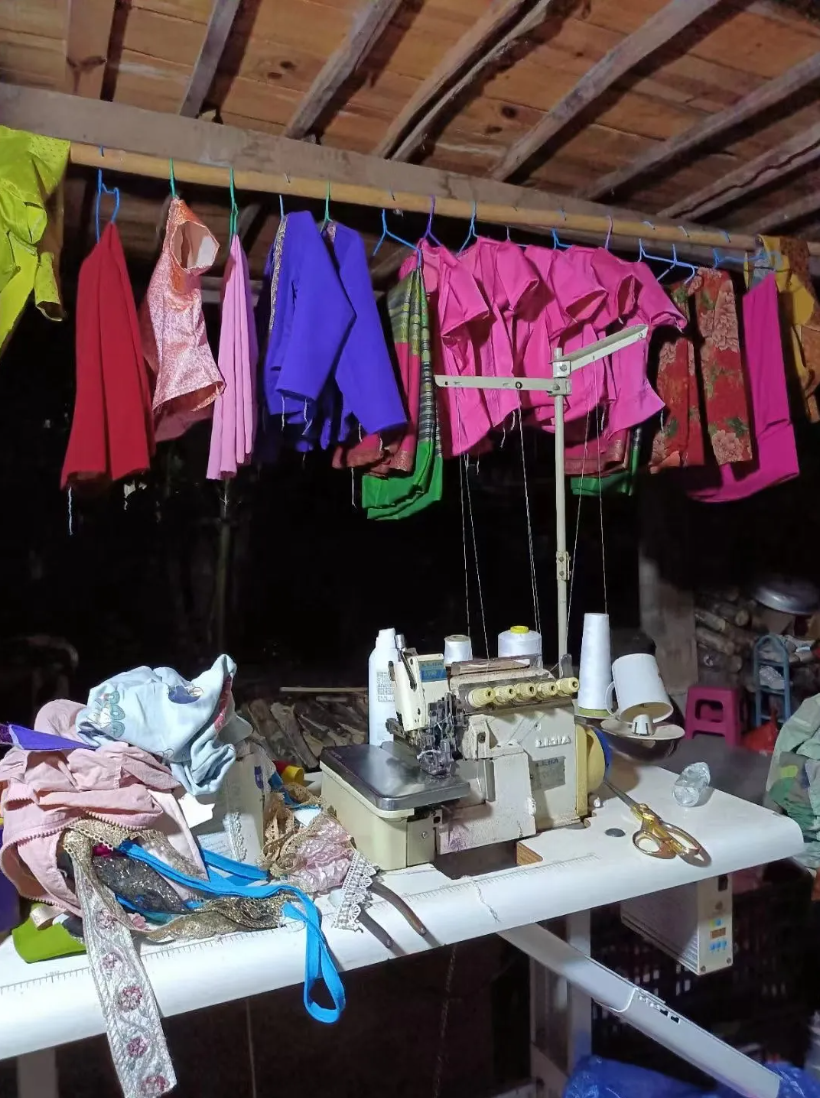
The good news was that after the transplant, Xiaoyan rarely got sick. It wasn’t until August 2022 that he caught his first cold. In the autumn of that year, Xiaoyan entered elementary school. Despite never having attended preschool, the boy communicated fluently in Mandarin and consistently ranked in the top three of his class. Although the family still had over 100,000 yuan in debt, Xiaoyan was no longer constantly in and out of the hospital, no longer needing blood transfusions or iron chelation therapy. They had finally escaped the grip of thalassemia, and their lives had finally started to stabilize.
Yi Xiangyue shared photos of Xiaoyan’s schoolwork, noting how neatly he wrote. The couple worked hard to pay off their debts—her husband tapping rubber, and Yi Xiangyue sewing Dai clothing. Life was simple, busy, and warm. Since Xiaoyan’s recovery after the bone marrow transplant, Yi Xiangyue has been tirelessly promoting the Jingyan Foundation’s thalassemia free screenings and educating other parents about the importance of genetic testing. “Believe in the power of science,” she says.
To Be Seen Is to Be Fortunate
After their visit to Xiaoyan’s family, on the afternoon of November 7, a team including Jingyan Secretary-General YE Zi, BGI Group CEO YIN Ye, and Chief Physician LIU Sixi from Shenzhen Children's Hospital visited another child with severe thalassemia, 11-year-old Xiaoyi. YI Xiangyue volunteered to serve as a Dai language interpreter for the group.
Xiaoyi, now 11, was abandoned by his mother when he was just nine months old and has since lived with his father and grandmother. In 2018, at the age of six, Xiaoyi underwent a splenectomy due to an enlarged spleen. Around the same time, his father was diagnosed with diabetes, which has now progressed to kidney failure. This has left him unable to do heavy labor, reducing his income from rubber tapping from 10,000–20,000 yuan a year to just 2,000–3,000 yuan. Xiaoyi's grandmother, now 73, cannot speak Mandarin and sustains the household by selling vegetables.
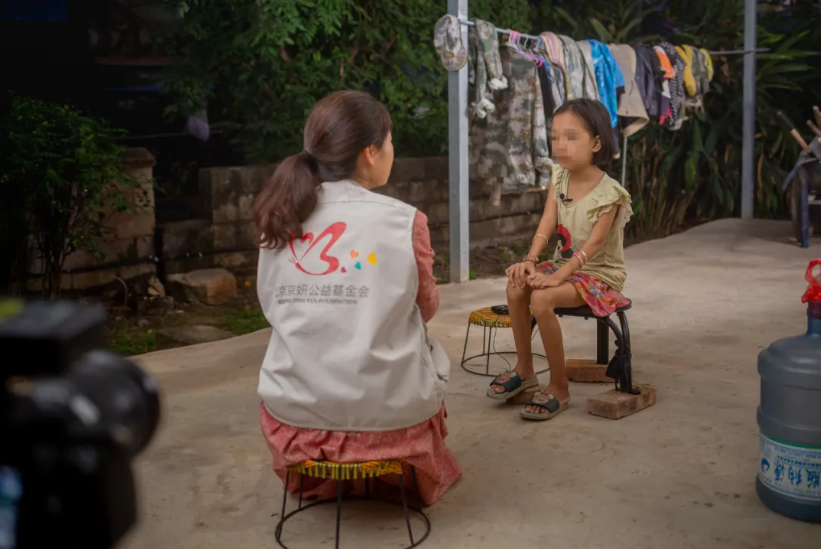
Each month, Xiaoyi must travel to the prefecture capital of Jinghong or the nearby city of Pu'er for blood transfusions. The journey involves switching from a motorcycle to a train and then to a bus, taking nearly half a day to complete. Often, they miss the return train and have to stay overnight. If the blood bank runs low on supplies or Xiaoyi isn’t feeling well, the stay can stretch even longer.
Xiaoyi’s family currently receives a monthly government subsidy of 900 yuan, but her medical expenses far exceed that amount. Her monthly blood transfusions alone cost 1,200 yuan, not to mention the additional 2,000 yuan required for iron chelation therapy. Financial constraints have prevented Xiaoyi from receiving sufficient transfusions, and the family’s inability to afford meat has left her severely malnourished. At 11 years old, Xiaoyi weighs just over 40 jin, reflecting her fragile condition.
Her health challenges have also disrupted her education. Unable to attend school regularly, Xiaoyi participates in a home-based learning program. Once a month, two teachers visit her to teach Chinese and math for less than an hour. The rest of the time, she spends scrolling on her phone or playing with "Mimi," her beloved tabby cat and closest companion. Without playmates her age, Xiaoyi explains, “Their parents are afraid that if their kids bump into me, they’ll have to pay a lot for my treatment.”
Recently, Xiaoyi’s father came across information about Jingyan’s thalassemia outreach clinic in a WeChat group and decided to sign up. This led to a connection with Jingyan, and Xiaoyi’s situation quickly drew concern from everyone involved. Discussions began immediately on how to provide support. Dr. LIU Sixi emphasized that Xiaoyi’s most urgent need is adequate blood transfusions for at least six months to stabilize her condition and prepare for further treatment.
Ultimately, Jingyan, BGI, and Shenzhen Children’s Hospital formed a partnership to support Xiaoyi. Jingyan will cover the cost of one year’s worth of sufficient blood transfusions, while BGI and Shenzhen Children’s Hospital will work together to analyze Xiaoyi’s blood samples and search for a compatible unrelated bone marrow donor. After a year of adequate transfusions and improved health, Xiaoyi will be evaluated for a potential bone marrow transplant.
Xiaoyi has stayed on everyone’s minds. Some have pledged to provide her with two eggs daily to improve her diet, while others are ensuring she eats meat regularly. Recently, Xiaoyi and her father were brought to Shenzhen, where her father is receiving treatment for kidney failure, and Xiaoyi is undergoing care to prepare for her next phase of treatment.
Jingyan Charity Foundation’s founder and chairperson, SONG Yan, reflected on Xiaoyi’s situation, saying, “Cases like this are truly heartbreaking. But now that she has been noticed, everyone will find ways to help her. In that sense, being seen is its own form of luck.”
SONG Yan said, "What we fear the most are the hidden cases—the ones that go unnoticed, undiagnosed by hematologists. We've encountered many children with thalassemia in remote villages whose parents believe they are possessed by evil spirits and turn to shamans for help, or worse, they simply give up altogether."
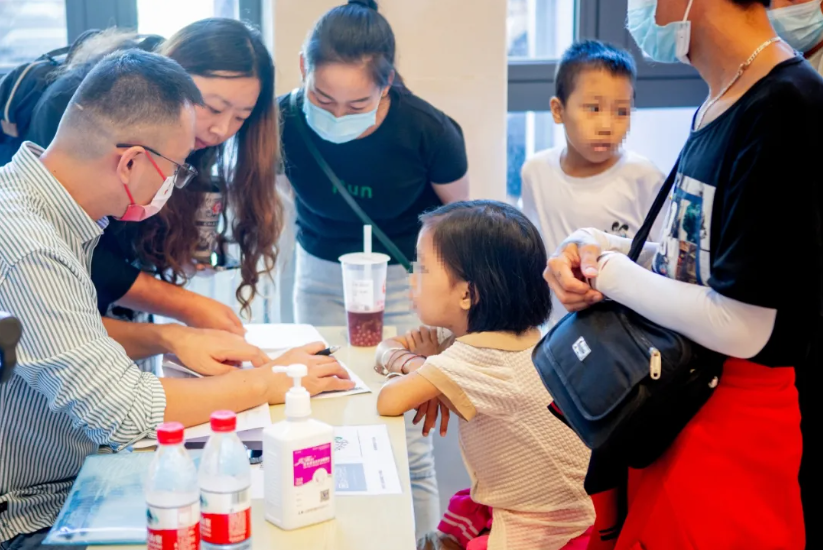
From these observations, Jingyan recognized the lack of awareness about thalassemia in remote areas, the insufficient attention from local authorities, and the limited diagnostic capabilities of primary healthcare. Since launching the Building Love for Thalassemia Action project, Jingyan has not only been providing direct assistance to children with severe thalassemia but has also been working tirelessly to raise awareness about the condition. Through free clinics, training, and outreach, they have intensified efforts to screen for thalassemia, empower grassroots doctors, and enhance their diagnostic and treatment skills. "The goal of all of this is to ensure that more thalassemia patients are identified early and receive the precise care and support they need," said SONG Yan.
Vision of "Zero Thalassemia"
In 2014, SONG Yan’s first child was born. The newborn developed jaundice, and at just a few days old, was placed in an incubator. As a first-time mother, SONG Yan was filled with anxiety until her child fully recovered. Some of the symptoms of thalassemia are similar to jaundice, which led SONG Yan to gain a deeper understanding of thalassemia. This experience ultimately became the catalyst for the launch of Jingyan's Building Love for Thalassemia public welfare project.
Thalassemia is a genetic blood disorder caused by mutations or deletions in the globin peptide chain genes and is recognized as a significant birth defect worldwide. According to the Blue Book on Thalassemia in China (2020), there are approximately 345 million carriers of thalassemia globally, with about 30 million in China. Severe and intermediate thalassemia patients number around 300,000, with the highest prevalence in the provinces south of the Yangtze River, particularly in Guangdong, Guangxi, Fujian, Jiangxi, Hunan, Hainan, Chongqing, Sichuan, Yunnan, and Guizhou.
The treatment for thalassemia is both lengthy and costly. For families, the birth of a child with severe thalassemia often marks the beginning of an ongoing challenge. In this context, saving a child with thalassemia not only supports the individual family but also contributes to improving the nation’s birth quality.


For severe thalassemia, treatment primarily involves regular blood transfusions, iron chelation therapy, and hematopoietic stem cell (bone marrow) transplantation. Studies show that the lifetime treatment cost for severe thalassemia patients who undergo blood transfusions and iron chelation can reach between 4 and 7 million yuan if they live to 50 years of age. On the other hand, the cost of a hematopoietic stem cell transplant ranges between 400,000 and 500,000 yuan, with the best outcomes typically seen in patients aged 4 to 12 years. Most patients who undergo successful transplantation can return to a healthy life.
Driven by her empathy as a mother, SONG Yan decided to do something for children suffering from thalassemia. After more than a year of planning, SONG Yan, alongside her husband, founded the Beijing Jingyan Foundation in December 2015, with a mission to support impoverished children suffering from serious diseases such as thalassemia, congenital heart defects, and prematurity. This family-run foundation is fully funded through the income of SONG Yan’s family. At the time, there were few organizations focused on thalassemia, and Jingyan's creation helped fill a significant gap in the charity sector. "Some organizations paid attention, but thalassemia was usually treated as a secondary issue. We made it our primary focus, aiming to specialize and make a profound, lasting impact," said SONG Yan.
Following three years of research and exploration, the foundation officially launched the Building Love for Thalassemia Action project in 2018. Initially, Jingyan’s efforts were centered on providing financial support for surgeries for children with severe thalassemia, offering 50,000 yuan in assistance to all eligible applicants. However, as they continued their work, they realized that addressing the root causes—such as awareness campaigns, premarital, and prenatal screenings—was critical to reducing the incidence of thalassemia. Additionally, they recognized that supporting these children beyond surgery, including with post-operative care, education, and employment opportunities, was essential to improving their quality of life.
With these insights, the Foundation redefined its approach, breaking it into three phases: prevention, treatment, and long-term support. During the prevention phase, Jingyan focuses on raising awareness about thalassemia, encouraging young couples—particularly those planning to start families—to undergo genetic screenings during premarital and prenatal check-ups. If genetic carriers of thalassemia are identified, couples can choose assisted reproductive technologies, such as third-generation IVF, to prevent the birth of a child with severe thalassemia. Additionally, Jingyan organizes annual training sessions for grassroots medical professionals, enhancing their ability to diagnose and treat thalassemia and, in turn, reducing the number of affected children. SONG Yan refers to this approach as a proactive strategy, emphasizing that "prevention is more important than treatment," as it reduces the long-term financial and emotional burdens on families and conserves national healthcare resources.
During the treatment phase, the Foundation provides financial assistance to families based on their specific needs. Initially, SONG Yan sought to fully cover the cost of surgeries, but after evaluating the situation, she realized that this would not provide sustainable support. As a result, Jingyan set a subsidy amount of 50,000 yuan for surgeries. Over time, they discovered that many families could access funding for bone marrow transplants through insurance or government aid, reducing their out-of-pocket expenses. Therefore, Jingyan adjusted its assistance to cover up to 50,000 yuan for bone marrow transplants and an additional 30,000 yuan for post-operative care, further tailoring the support based on each family’s financial needs. For children facing particularly difficult circumstances, like Xiaoyi, Jingyan offers individual assistance.
SONG Yan emphasizes that this approach allows for more precise and effective support. Post-transplant care is particularly critical, as patients’ environments and medical supplies must meet stringent standards to prevent infections, which could otherwise jeopardize their health. For instance, one child, supported by the foundation, contracted a bacterial infection after unknowingly consuming an apple from another patient, which delayed recovery and added 120,000 yuan to their medical costs. In response, Jingyan developed the Jingyan Care Package, valued at 2,000 yuan, containing essential items like sterilization lamps and cabinets for post-surgery care.
Jingyan also uses its website and social media channels to provide ongoing educational resources. The "Thalassemia Classroom" regularly updates videos and live sessions, helping parents learn essential post-operative care and other relevant thalassemia-related information. Even after a child recovers, Jingyan’s commitment to their well-being continues. The Foundation conducts regular follow-up visits and maintains communication with families through support groups. If challenges arise in areas like education or employment, Jingyan provides additional assistance.
In the five years since its launch, the Building Love for Thalassemia Action project has supported 828 bone marrow transplant surgeries, investing over 40 million yuan. Jingyan has gained widespread recognition within the thalassemia community, with nearly every parent of a thalassemia child aware of the Foundation’s work and impact.
In these five years, Jingyan has also witnessed and been part of the significant improvements in thalassemia treatment. In the past, there were very few hospitals capable of performing bone marrow transplants; now, Jingyan collaborates with 19 hospitals. A few years ago, hospitals could only perform fully matched bone marrow transplants; now, they can also conduct half-matched transplants. Previously, bone marrow transplants were primarily available for children before puberty, but now, some older children are also eligible for the procedure…
At the same time, both government attention to thalassemia and public awareness continue to grow. Notably, in regions with high thalassemia prevalence, such as Hainan, a multi-tiered medical assistance initiative called “Haihui Help” was launched in Haikou this May. The platform provides one-stop support for families of thalassemia patients facing financial hardships, those unable to afford long-term treatments like hematopoietic stem cell transplants, and those in need of ongoing blood transfusions. In early December, Sanya Women and Children’s Hospital also began offering free genetic testing and matching services for severe thalassemia patients. These advancements have brought renewed hope to Jingyan.
The years 2023 to 2028 mark the second five-year phase of Jingyan's Building Love for Thalassemia Action project. Reflecting on the goals for the next five years, SONG Yan expressed, “We aim to strengthen collaboration with governments, businesses, and other public welfare organizations to achieve a ‘zero thalassemia’ future.” The progress made so far makes her optimistic that this goal is within reach.
The health of thalassemia patients supported by Jingyan has significantly improved, with most children returning to school. The oldest of these children is now in high school, a clear indication of progress. Every time SONG Yan and her team witness these successes, they are filled with immense satisfaction, as this is the very vision they have strived to achieve: a future where every child and every family experiences health, happiness, and hope. However, their ultimate aspiration is to be in a world without thalassemia. “We hope that one day, we won’t find any children suffering from thalassemia, and this project will no longer be needed.”
Keywords:
Related News

